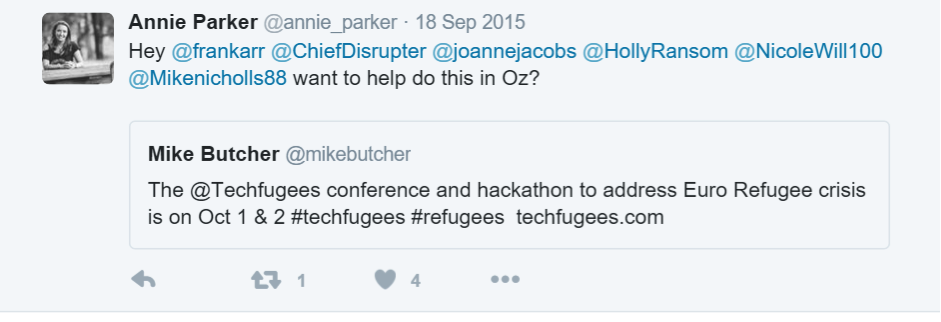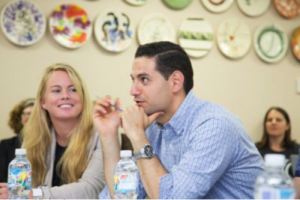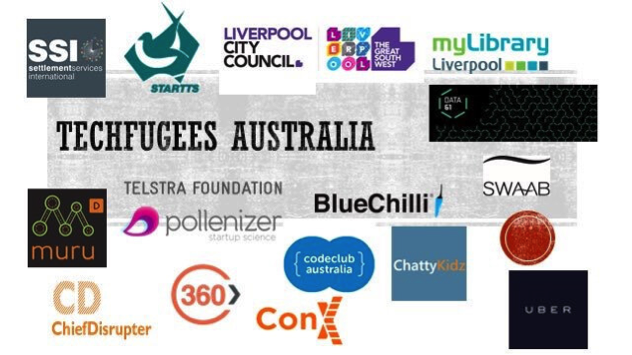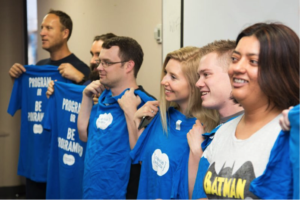Around 200 people descended on a suburban library in the Western Sydney suburb of Liverpool on 28/29 November 2015 to hack for better solutions to refugee settlement, kicking off the first Techfugees Australia event.

By Anne-Marie Elias, Techfugees Australia
It all started with a tweet. Inspired by Techfugees founder Mike Butcher, Annie Parker from muru-D put the word out and Nicole Williamson and I jumped on board without hesitation.
Then came an extraordinary response from the startup and tech community – the likes of tech guru Liz Buchanan, Frank Arrrigo (API Evangelist, Telstra), Phil Morle (Pollenizer), Alan Jones (Blue Chilli), Joanne Jacobs (Disruptors Handbook), Mon Wulff (StartUp Muster), Claudia Barriga-Larrivière (StartUp Milkshake), Liz Jakubowski and Dean Economou (Data61), Ryan Cross, Jack Skinner (MYOB) and Steve King (Atlassian) and the jewels of the crown – Shelli Trung (Angel Investor) and Michael Aschorobi (Google), both former refugees.
And so around 200 people descended on a suburban Library in the Western Sydney suburb of Liverpool on 28/29 November 2015 to hack for better solutions to refugee settlement.


Who was at the event?
In partnership with the Mayor of Liverpool City Council, two NGOs – Settlement Services International and STARTTS – and the tech and startup community, we collaborated with former refugees to co-design eleven solutions for refugee settlement in under 24 hours.
We had hackers from IBM, Telstra, Saleforce, Atlassian and MYOB and a few entrepreneurs and designers. We even had a hacker from New York who submitted his idea and answered judges’ questions on the phone, along with Anna and Ahmed who flew up from Melbourne.

What makes Techfugees hackathons so special?
It is astounding what happens when you throw bunch of unrelated people together and give them a limited amount of time to produce a result. It’s even more amazing when you support them with some of the top tech and startup mentors in the industry.
The spirit of collaboration kicked in from day one, and despite the fact that the majority of teams had never met before, the energy was magical.
There is this extraordinary alchemy that happens at hackathons. People that are drawn to them have shared values or they wouldn’t bother to give up their weekend to spend it with a bunch of strangers. Their differences are a strength and I have yet to attend a hack without great diversity in skills, culture and religion. Hackers are always committed to positive outcomes and they are the most generous and kind-hearted people I have ever met.

How was the hackathon structured to ensure that real solutions emerged?
Michael Ascharsobi from Google, a former refugee himself, said, “I can’t believe that some of the solutions respond to problems I had 15 years ago. That’s crazy we haven’t solved these problems yet.” I think Michael articulated what every person in the room was thinking: look at what we can do when bring together a different set of people to solve problems that affect people’s lives.
We wanted to make sure the weekend was as productive as possible. We embedded beneficiary co-design and funding product development in the package of the hack. We framed it around 6 themes identified by the NGOs, with former refugees pitching their story and the teams forming around solving the refugee problems.
The former refugees collaborated with entrepreneurs, designers and techs over the weekend to co-design solutions. Every pitch was professional and polished. Annie, who has seen hundreds of pitches in her time, was impressed with the calibre.
The results were the astounding submissions which can be found on DevPost.
Let’s not forget that the teams didn’t even have 48 hours! We started on Saturday around midday and worked until 5pm, and on Sunday we kicked off at 9am and submissions were complete by 3pm. So it’s incredible that 11 quality ideas were developed and pitched at 4pm before an excited audience of 100 people.
Which projects really stood out?
The submissions addressed the themes of language acquisition, connecting to community, employment, vocational and occupational opportunities. Some of my highlights were:
- Bust the Bubble which connects professionals with skilled refugees
- Skills Connect, which connects companies with skills shortages to skilled refugees
- Refugee Intern, which is now RefugeeTalent, a registered company with two big organisations ready to place the first crop of refugees into internships (the Australian Broadcasting Corporation and Deloittes)
- ArrivalHub, an app and website connecting new migrants to local services and businesses. The Mayor of Liverpool, Ned Manoun, has offered his support to develop the app for Liverpool
And how about the winners?
The winner was GoalifyOz, a goal-setting app for case worker and refugee collaboration. The team have been working with Pollenizer and SSI to incubate the concept and have rebranded as SettleIn.
Second prize went to Our Table, who were given mentoring support from Data61 and Expert360. They came second place with their OurHome app connecting refugees with community through food occasions and events.
DocLink won the Spirit of Techfugees Australia for designing an elegant tool connecting refugees to local bulk-billing GPs and health services that provide language services.
The impressive $10,000 prize was sponsored by SSI and STARTTS, with the generous mentoring from Pollenizer which ensures that the winner is supported to develop the product to launch.
Thank you to everyone involved
The Techfugees Australia spirit is the sum of every single person who participated, mentored, organised, cheered on from the sidelines, wrote articles and blogs and who followed our journey on Twitter and Facebook and our sponsors and partners who took a leap of faith in our social design method.
I know the SSI and STARTTS staff, clients and former refugees felt energised and full of renewed hope that there is a better way to design and solve problems through tech and startup, and ultimately make it easier for refugees to settle in their new country.
Key dates
Techfugees Australia: Young People, 4-6 November 2016
This will focus on refugee young people in Parramatta in Western Sydney. Please follow us on Twitter for the latest information: TechFugees Australia
The next Melbourne Techfugees hackathon will be held early 2017.
For more info please contact Lynda Ford, +61 414 440 483, Lynda@igenfoundation.com
We have also been approached by an NGO in QLD to run a TechFugees Australia there later this year too, so we’ll update you when we have more information.
Keep in touch
Find Techfugees Australia on Twitter, Facebook and DevPost.
Connect with Anne-Marie Elias, Annie Parker, Nicole Will and Lynda Ford on Twitter.
About the author
Anne-Marie Elias is Co-founder of Techfugees Australia with Annie Parker and Nicole Williamson. A speaker and consultant in innovation and disruption for social change, she is an honorary Associate of the Institute for Public Policy and Governance at UTS.
